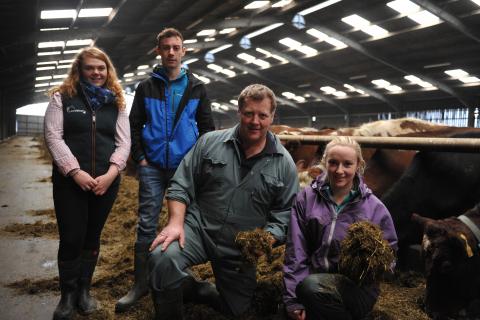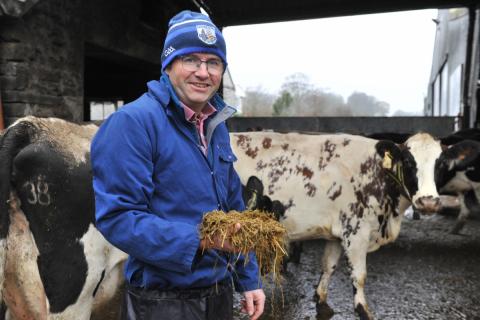20 December 2018
Data gathered during a two-year trial involving multiple dairy farms in south west Wales could help grass-based producers harness a market advantage from higher levels of beneficial fatty acids in certain types of milk.
Seimon Thomas and Tom Harris are two of the 20 farmers whose feeding systems are being scrutinised during a European Innovation Programme (EIP) Wales project examining the complete fatty acid profile of milk produced.
The results could give them and other dairy farmers the opportunity to develop forage-based solutions to produce milk with enhanced levels of beneficial fatty acids such as omega-3.
“If we can substantiate where the omega-3 advantages exist, it will provide opportunities to incorporate this message into the branding and marketing of our milk,’’ said Mr Thomas, who runs a herd of 900 Dairy Shorthorns at Drysgolgoch, near Llanfyrnach, with his wife, Eleanor, and their children, Sion and Hanna.
Milk and forage samples from all 20 farms are submitted on a monthly basis to the Institute of Biological and Environmental Research (IBERS) at Aberystwyth together with a questionnaire on feeding practices at the time of sampling.
Hanna Thomas, who gathers these samples at Drysgolgoch, says milk producers must seize every opportunity to add value and EIP Wales had provided a platform for that.
The farmers involved in the project have diverse systems ranging from conventional herds that are housed in winter and graze in summer and herds housed all-year round to organic herds and spring block calving systems. Some fully housed herds are also practicing zero grazing where fresh grass is harvested daily for the cows.
The group supply their milk to different milk buyers and processors, including commodity liquid milk, premium organic liquid milk, cheese manufacturers and high value food ingredient manufacturers.
These outlets could all potentially take advantage of the project results, for example by marketing milk for its higher omega-3 content.
The Thomas family runs two herds on different systems – 350 autumn calvers housed from September to March and a similar sized spring block calving herd that grazes from February to the beginning of December; this provides a unique opportunity to compare and contrast the omega-3 content in their milk.
At Ffosyficer near Abercych, the project will focus on milk from Tom and Francisca Harris’ herd of autumn calving Holstein Friesians.
The couple have experience of adding value to milk - their family produces the Daioni range of organic flavoured and fresh milks.
The couple had previously contemplated funding their own study into omega-3 in milk but, as an individual business, it would have proved costly due to the large amount of scientific research required to provide substantiated evidence.
They therefore welcomed the EIP Wales collaborative approach.
“We are delighted to be participating in the trials and look forward to the results that will be published at the end of the two years,’’ said Mr Harris.
EIP projects aim to strengthen research and innovation within the agricultural sector in Wales, bridging the gap between research and roll-out on farm.
EIP Officer Owain Rowlands said there are currently 19 approved projects on a variety of topics including animal health, genetics and alternative crops.
“All these projects are farmer-led and will enable farmers to take the outcomes of research and apply them to their farms,’’ he explained.
There is good support available to farmers and foresters who want to make most of the scheme, through Innovation Brokers.
Emily Jones, of Landsker Business Solutions Ltd, who helps to administer the milk omega fatty acid project, said the role of the Innovation Broker was to guide applicants through the application process in the first instance.
“If the application is successful our job is to then facilitate the project throughout its lifetime,’’ she said.


